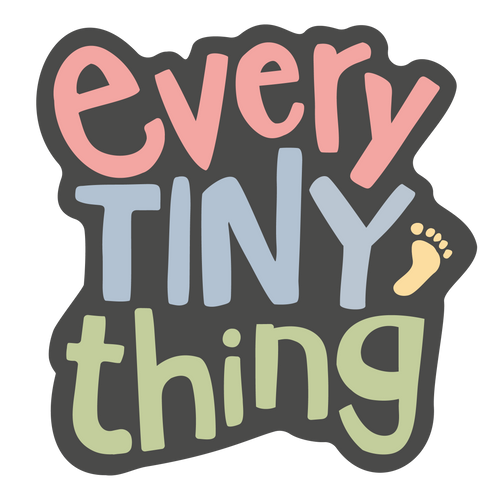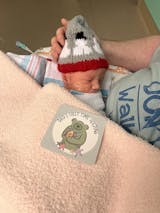
World Kangaroo Care Day is coming up soon - May 15, 2023!
If you're a parent with a baby in the NICU, you may have heard the term "kangaroo care" thrown around by your healthcare team. But what exactly is kangaroo care, and why do so many NICU parents swear by it? Let's take a closer look.
Kangaroo care, also known as skin-to-skin contact, involves placing your baby, wearing only a diaper, directly onto your bare chest. You then cover your baby with a warm blanket or clothing to maintain their body temperature, and cuddle, hold and interact with them in this position for an extended period of time.
But why do NICU parents love kangaroo care so much? Well, the benefits for both baby and parent are numerous.
For babies, kangaroo care helps regulate their heart rate, breathing, and temperature, all of which can be particularly important for premature or low birth weight infants. It can also reduce their levels of the stress hormone cortisol, and even help them sleep better.
But the benefits aren't just limited to the baby.
Parents who practice kangaroo care have been shown to have increased feelings of bonding and attachment with their baby. It can also help regulate the parent's hormones, including oxytocin, which is often referred to as the "love hormone" and is associated with feelings of well-being and happiness.
Kangaroo care can have a significant positive impact on mothers in the NICU. For women who may have had a traumatic birth experience or who are struggling with postpartum depression, holding their baby skin-to-skin can provide a sense of comfort and healing. It can also help with milk production and breastfeeding, as the skin-to-skin contact helps stimulate the production of prolactin, the hormone responsible for milk production.
Dads can also benefit greatly from doing kangaroo care with their babies. It's an opportunity for them to bond with their newborns and feel more involved in their care, especially if they are not able to be physically present in the NICU all the time. It can also be a great way for dads to provide support and comfort to their partners, who may be feeling overwhelmed or anxious about their baby's health. In fact, some dads have even reported feeling more confident and capable as parents after doing kangaroo care with their babies.
As a nurse, there are few moments in the NICU that compare to handing a premature baby to their parent for the first time. It's a moment filled with hope and anticipation, but also with nervousness and trepidation. As nurses, we do everything we can to ensure that the moment is as safe and comfortable as possible for both the baby and the parent.
We carefully check the baby's vital signs and ensure that they're stable and ready for skin-to-skin contact. We prepare the parent for what to expect, making sure they're comfortable and that their clothing allows for easy access to the chest. We provide blankets to keep both the baby and the parent warm, and we're ready to step in at a moment's notice if there are any issues.
When the moment finally arrives, there's often a sense of nervousness in the air. The parent may be afraid to hold their baby for fear of hurting them, while the baby may be overwhelmed by the sudden change in environment. But once baby is snuggled in and secure, the joy is palpable.
As a nurse, it's an amazing thing to witness. We watch as the mother's confidence grows with each passing moment, and we see the bond between mother and child strengthening right before our eyes. It's a reminder of why we do what we do, and it's a testament to the resilience and strength of both mothers and their premature babies.
Kangaroo care can also be an important part of the healing process for parents. The NICU can be a stressful and overwhelming place, and holding their baby in this way can provide parents with a much-needed sense of comfort and reassurance. It can also give them a sense of empowerment and control during a time when they may feel like they have very little control over their baby's care.
Of course, there are some situations where kangaroo care may not be possible, such as when a baby is critically ill or unstable. In those cases, your healthcare team will work closely with you to find other ways to promote bonding and interaction, such as talking or singing to your baby, or even just placing a hand on them while they're in the incubator.
But in the vast majority of cases, kangaroo care is not only possible, but highly encouraged. And the benefits go far beyond just the physical health of the baby. Kangaroo care can help create a sense of connection and intimacy between parent and child that is hard to put into words. It's a reminder that, even in the midst of a difficult and often scary experience, there is still so much joy and love to be found.
So, if you're a parent with a baby in the NICU, don't be afraid to ask your healthcare team about kangaroo care. It may feel intimidating at first, but I promise it's worth it. And if you're a nurse or other healthcare provider working with NICU families, I encourage you to promote and facilitate kangaroo care whenever possible. It's one of the simplest and most effective ways we can help promote the health and well-being of both parent and baby.

